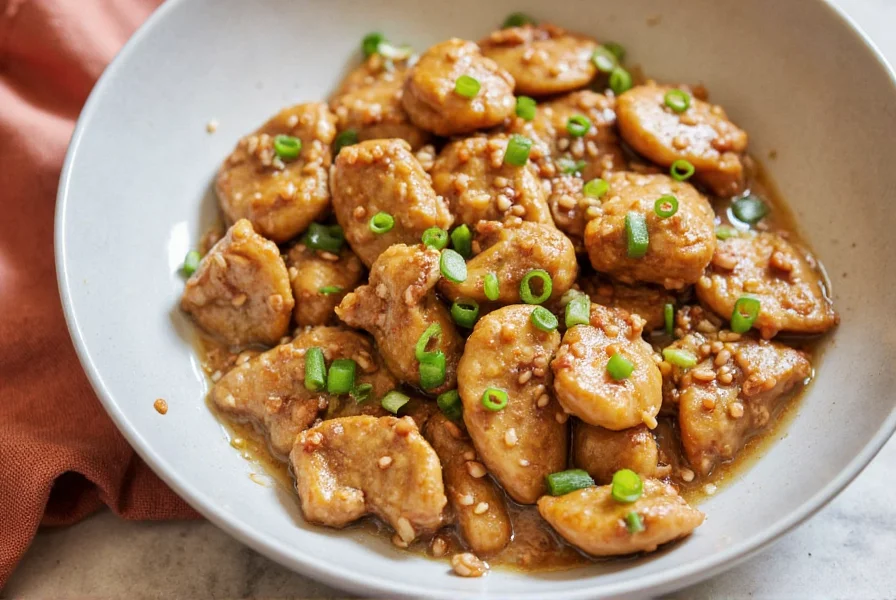If you're searching for an authentic sesame ginger chicken recipe that delivers restaurant-quality results at home, you've found the definitive guide. This beloved Asian fusion dish has gained worldwide popularity for its perfect harmony of flavors and impressive yet approachable preparation method.
The Essential Ingredients for Authentic Flavor
Creating exceptional sesame ginger chicken starts with understanding the role of each component in the flavor profile. The magic happens through the combination of:
- Fresh ginger - Provides the signature warm, slightly spicy backbone (never substitute with powdered ginger for best results)
- Toasted sesame oil - Adds nutty depth (use sparingly as it's potent)
- Low-sodium soy sauce - Creates the savory umami foundation
- Rice vinegar - Balances sweetness with bright acidity
- Honey or brown sugar - Counteracts saltiness with caramel notes
- Garlic - Complements the ginger with aromatic complexity
| Ingredient | Amount | Preparation Tip |
|---|---|---|
| Chicken breast or thigh | 1.5 lbs | Cut into 1-inch cubes for even cooking |
| Fresh ginger | 2 tbsp, grated | Use microplane for finest texture |
| Soy sauce | 3 tbsp | Low-sodium preferred |
| Sesame oil | 1 tbsp | Add at the end for maximum flavor |
| Rice vinegar | 1 tbsp | Essential for flavor balance |
Step-by-Step Preparation Guide
Follow these professional techniques to achieve perfect sesame ginger chicken every time:
- Marinate properly - Combine chicken with 2 tbsp soy sauce, 1 tbsp rice vinegar, and 1 tsp cornstarch. Let rest 15 minutes (this tenderizes while helping sauce cling)
- Prepare sauce separately - Whisk remaining soy sauce, grated ginger, garlic, honey, and 2 tbsp water in small bowl
- High-heat cooking - Heat neutral oil (like avocado) in wok or skillet over medium-high until shimmering
- Sear chicken - Cook chicken in single layer without crowding (work in batches if needed) for 2-3 minutes per side until golden
- Add sauce carefully - Pour sauce over chicken, bring to simmer, and cook 2-3 minutes until thickened
- Finish with sesame - Remove from heat, stir in sesame oil and toasted sesame seeds
Pro Tips for Restaurant-Quality Results
Achieving authentic sesame ginger chicken requires attention to these critical details:
- Don't overcook the chicken - Remove from heat when internal temperature reaches 155°F (it will carryover cook to 165°F)
- Use fresh ginger - Dried ginger lacks the vibrant, spicy-sweet notes essential to this dish
- Control sauce thickness - If too thin, mix 1 tsp cornstarch with 1 tbsp cold water and stir in; if too thick, add water 1 tsp at a time
- Balance flavors - Taste before serving and adjust with rice vinegar (for brightness), honey (for sweetness), or soy sauce (for saltiness)
Variations and Serving Suggestions
Customize your sesame ginger chicken recipe with these popular adaptations:
- Vegetable-packed version - Stir-fry bell peppers, snap peas, and broccoli alongside the chicken for a complete meal
- Spicy kick - Add 1-2 tsp sriracha or red pepper flakes to the sauce
- Gluten-free option - Substitute tamari for soy sauce
- Meal prep friendly - This dish stores well in the refrigerator for up to 4 days and reheats beautifully
Serve sesame ginger chicken over steamed jasmine rice, cauliflower rice for low-carb option, or alongside noodles. Garnish with sliced green onions and extra sesame seeds for presentation. For a complete Asian-inspired meal, pair with egg rolls or miso soup.
Common Mistakes to Avoid
Even experienced cooks make these sesame ginger chicken errors:
- Using old sesame oil - Rancid sesame oil ruins the dish (check expiration date and refrigerate after opening)
- Overcrowding the pan - Causes steaming instead of searing, resulting in soggy texture
- Adding sesame oil too early - High heat destroys its delicate flavor (always add at the end)
- Skipping the cornstarch - Essential for proper sauce consistency and helping it adhere to chicken
Frequently Asked Questions
How long does sesame ginger chicken stay fresh in the refrigerator?
Properly stored in an airtight container, sesame ginger chicken maintains quality for 3-4 days in the refrigerator. For best results, store sauce and chicken separately from rice or noodles, which can become soggy when stored together.
Can I make sesame ginger chicken ahead of time for meal prep?
Yes, this dish is excellent for meal prep. Cook the chicken and sauce, then store separately from rice or vegetables. When reheating, add a splash of water to revive the sauce consistency. The flavors often deepen when allowed to meld overnight in the refrigerator.
What's the best substitute for fresh ginger in sesame ginger chicken?
While fresh ginger delivers superior flavor, you can substitute 1/2 tsp ground ginger per tablespoon of fresh ginger needed. However, this will create a different flavor profile - ground ginger is warmer and less bright. For better results, try crystallized ginger finely minced (use 1:1 ratio).
Why is my sesame ginger chicken sauce too thin?
A thin sauce typically results from insufficient cornstarch or too much liquid. To fix this, mix 1 teaspoon cornstarch with 1 tablespoon cold water to create a slurry, then stir into simmering sauce. The sauce should thicken within 60 seconds. For future batches, ensure you're using the proper cornstarch-to-liquid ratio in your recipe.
Can I use chicken thighs instead of chicken breast for sesame ginger chicken?
Absolutely. Chicken thighs work exceptionally well in sesame ginger chicken recipes as their higher fat content keeps them moist during cooking. When using thighs, reduce cooking time by 1-2 minutes per side since they cook faster than breast meat. The richer flavor of thighs actually complements the bold sesame ginger sauce beautifully.











 浙公网安备
33010002000092号
浙公网安备
33010002000092号 浙B2-20120091-4
浙B2-20120091-4